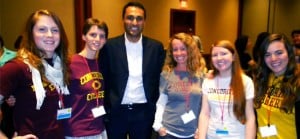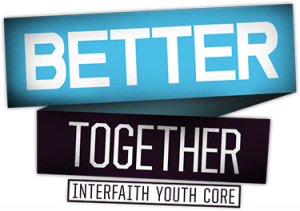I’ve written here before about what it might mean to be a person of faith and an atheist ally. It’s something that not enough Christians talk about. Growing out of this work, I’ll be part of a panel at the American Academy of Religion meeting in Baltimore this coming November talking about negotiating Christian privilege, focused on “Teaching the College Nones.” I plan to talk about what the growing presence of secular, agnostic, and atheist students on our college and university campuses means for the teaching of religion and interfaith dialogue.
 So I wanted to share part of a great story from Concordia College in Moorhead, Minnesota, where the Secular Student Community was recently approved as a student organization after a two-year struggle with campus governance and climate.
So I wanted to share part of a great story from Concordia College in Moorhead, Minnesota, where the Secular Student Community was recently approved as a student organization after a two-year struggle with campus governance and climate.
A central question was: Is an organization for nonreligious students in keeping with the mission and values of a college of the Evangelical Lutheran Church in America?
Eventually, the answer was yes.
Chris Stedman, with Andreas Rekdal, describes in a piece over at The Huffington Post how the process unfolded, and considers what ultimately made possible the approval of the group just this past month:
Significantly, nonreligious students had become active participants in campus-wide interfaith efforts. In fact, atheists, agnostics and Humanists were significantly overrepresented in Concordia’s Better Together interfaith campaign, which was led by the school’s most outspoken atheist, Kristi Del Vecchio. These students saw the value of interfaith dialogue for all people — particularly for religious minorities such as atheists, agnostics and the nonreligious — and decided to become active proponents of interfaith dialogue on campus.
Recognizing nonreligious students’ desire to be part of the discussion on faith at Concordia, administrators and faculty began to reach out in support. The chairperson of Concordia’s Religion department called administrators to ask why the Secular Student Community’s application process was taking so long. Concordia’s Campus Ministries invited Del Vecchio to speak during interfaith chapel week. Using the opportunity to clear the air about stereotypes surrounding atheism and emphasizing the common ground she sees between herself and her religious peers, Kristi helped spark a renewed discussion around the role of seculars within the institution.
It is a great example of how proactive and constructive work made a difference for this campus community. Students were able to dispel stereotypes by engaging in service, dialogue, and community building across faith lines, and across that difficult line between faith and no-faith.
 I spoke with Dr. Jacqueline Bussie, director of the college’s Forum on Faith and Life, one of the many supportive faculty leaders during these two years of concentrated efforts. She noted how this is primarily an example of a grassroots student movement succeeding, and said
I spoke with Dr. Jacqueline Bussie, director of the college’s Forum on Faith and Life, one of the many supportive faculty leaders during these two years of concentrated efforts. She noted how this is primarily an example of a grassroots student movement succeeding, and said
“I am proud of the time, care and attention my institution took with this important decision. I am thrilled that, as a leader in interfaith cooperation, Concordia College has demonstrated that nonreligious students equally have a place as partners in dialogue and service.”
And as for how the presence of a Secular Student Community resonates with the college’s religious tradition, Bussie noted:
“The Lutheran tradition has always created space for doubt, questioning, wonderment, and the acknowledgment that faith is a struggle, as demonstrated when Martin Luther himself referred to God as the hidden god during his own times of deep suffering. This truth about the Lutheran tradition has always led me to embrace our secular brothers and sisters as family; for indeed, they often understand and can empathize with my own moments of doubt, disbelief, and questions better than anyone.”
In his article, Stedman concludes:
Concordia’s students, faculty and administration have clearly shown that, in a world fixated on culture wars and disagreements, there is another way forward for atheists and the religious — one defined by mutual respect and support, rather than condescension or dismissal. I hope that religious and nonreligious people alike will look to them when considering how to treat their friends and neighbors with different beliefs, and recognize that by working together we can build a more compassionate and inclusive world for all.
Let’s hope so!
For more on the ELCA and its commitments to interfaith work, check out my earlier post on Interfaithing Lutherans.












